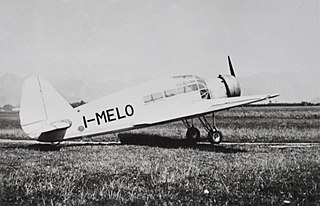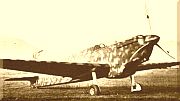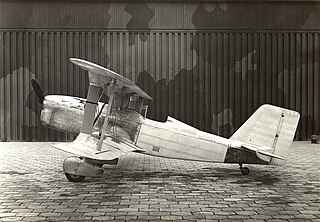
The Caproni PS.1, also known as the Pallavicino PS-1 and Caproni Ca.303, was an Italian four-seater sportsplane, designed and built specifically to compete in Challenge 1934, the European touring plane championships.

The Caproni Ca.309 Ghibli was an Italian aircraft used in World War II. Its nickname 'Ghibli' refers to a desert wind that later served as the inspiration for animation Studio Ghibli's name.

The Yakovlev Yak-50 aerobatic aircraft is a single-seat all-metal low-wing monoplane with retractable main wheels and exposed tail wheel. The control surfaces are fabric-covered to save weight. The aircraft is not equipped with flaps.

The Caproni Ca.165 was an Italian biplane fighter developed just before World War II, but produced only as a prototype, as the competing Fiat CR.42 Falco was selected for series production.

The Caproni Ca.101 was a three-engine Italian airliner which later saw military use as a transport and bomber. It was designed in 1927 and first flown in 1928.
The Piaggio P.32 was an Italian medium bomber of the late 1930s, produced by Piaggio, and designed by Giovanni Pegna. It was a modern design for its time, but was a failure due to lack of powerplants commensurate with its high wing loading.

The Caproni Ca.335 Maestrale (Mistral) was an Italian single-engined two-seat fighter-bomber/reconnaissance aircraft of the 1930s.
The Caproni Ca.350 was an Italian single-engined project for a two-seat fighter-bomber/reconnaissance aircraft of the 1930s. Designed by Cesare Pallavicino to meet a requirement of the Regia Aeronautica, it was an innovative and fast design, to have been powered by an Isotta Fraschini Zeta R.C.42, but no aircraft were built.

The Caproni Ca.95 was a large, three engine, long range, heavy bomber prototype built in Italy in 1929. It could carry a 1,600 kg (3,500 lb) bomb load and had three defensive gun positions. Only one was built.
The Caproni Ca.131 was a prototype for a large aircraft built in Italy in 1934, intended for use as either a bomber or airliner. It was a conventional low-wing cantilever monoplane, powered by a radial engine on each wing and in the nose. The main undercarriage was housed within large streamlined spats. Configured as an airliner, it would have seated 17 passengers.

The Caproni Ca.87 was an Italian flying boat built in the 1920s for a planned transatlantic flight.

The Caproni Ca.603 was an aerobatic training aircraft built in Italy by Caproni in the early 1940s.
The Caproni Ca.66 and Caproni Ca.67 were Italian night bomber aircraft designed to re-equip the post-World War I Regia Aeronautica.
The Caproni Ca.79 was an Italian light bomber produced in the mid-1920s.
The Caproni Ca.103 was a biplane twin-engine bomber developed by the Italian company Aeronautica Caproni in the late 1920s.
The Caproni Ca.120 was a three-engine monoplane bomber built by Caproni in the 1930s.
The Caproni Ca.127 was a single-engine reconnaissance monoplane built by Caproni in the mid-1930s.
The Caproni Ca.142 was a three-engined multirole aircraft built by Caproni in the mid-1930s.

The Caproni Ca.53 was an Italian prototype light bomber built in the last months of World War I.
The Caproni Ca.146 was a high-wing reconnaissance aircraft built by Caproni in the mid-1930s.










